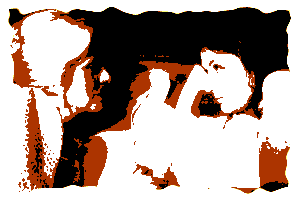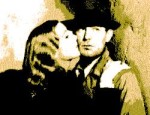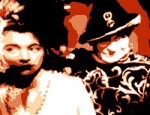Film Review

Catherine Deneuve is well-suited to play the lead in a quirky fairytale, having already fulfilled this role already in three of Jacques Demy's films (notably Les Parapluies de Cherbourg (1964)), and after getting Marcello Mastroianni pregnant in another Demy film (L'Événement le plus important depuis que l'homme a marché sur la lune), starring in a Claude Lelouch film was the obvious next step in her career. Deneuve turns out to be the best thing the film has going for it, her solid performance grounding the story in a tangible reality which the director seems determined to undercut with his usual cinematographic histrionics. The film's violent mood swings are as likely to induce nausea as the galloping camera motion and Lelouch doesn't confine his artistry to the visuals: the soundtrack is just as zany, with sound effects that would not be out of place in one of Roman Polanski's weirder films.
Si c'était à refaire is pretty tame compared with Lelouch's more over-the-top offerings, such as his previous magnum opus Toute une vie (1974), but it is still an indulgence fest that can become wearisome if you prefer a film to have more content than style. Deneuve's presence, helped by contributions from Francis Huster and Charles Denner, prevents the film from disappearing up its artistic orifice and overall it is one of the more satisfying Lelouch offerings of this decade.
© James Travers 2000
The above content is owned by frenchfilms.org and must not be copied.
Film Synopsis
Aged 35, Catherine Berger leaves prison after having completed a 15 year prison sentence for complicity in the murder of her employer. She gave birth to a son whilst in custody and, once released from prison, intends to rebuild her life with him...© James Travers
The above content is owned by frenchfilms.org and must not be copied.
Similar Films
Here are some other films you may enjoy watching:- Katzelmacher (1969)
- The Great Gatsby (1974)
- Nuit d'été en ville (1990)
- Sept jours ailleurs (1969)
- La Chamade (1968)
Other related links:
Film Credits
- Director: Claude Lelouch
- Script: Claude Lelouch
- Cinematographer: Jacques Lefrançois
- Music: Francis Lai
- Cast: Catherine Deneuve (Catherine Berger), Anouk Aimée (Sarah Gordon), Charles Denner (L'avocat), Francis Huster (Patrick), Colette Baudot (Lucienne Lanot), Jean-Jacques Briot (Simon Berger), Jean-Pierre Kalfon (Le bijoutier), Manuella Papatakis (La fille de Sarah), Jacques Villeret (L'agent immobilier), Niels Arestrup (Henri Lanot), Zoé Chauveau (Zoé), Bernard-Pierre Donnadieu (Claude Blame), Nicole Desailly (Une gardienne de prison), Jean-François Rémi (Le banquier), Françoise Hardy (Herself), Élie Chouraqui (Le dragueur), Betty Mars (Herself), Valérie Lagrange, Georges Staquet, Albina du Boisrouvray
- Country: France
- Language: French
- Support: Color
- Runtime: 105 min
- Aka: Second Chance
The best of American film noir

French cinema during the Nazi Occupation

The silent era of French cinema
